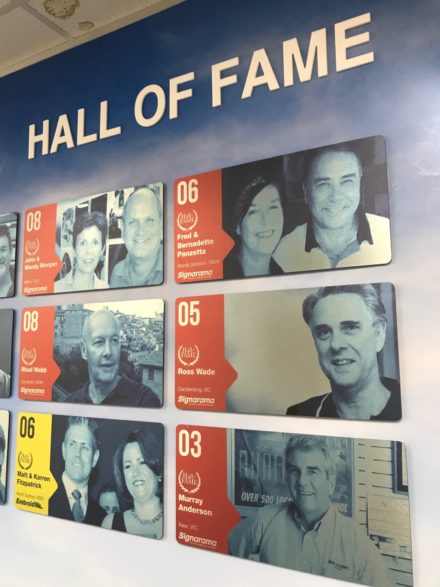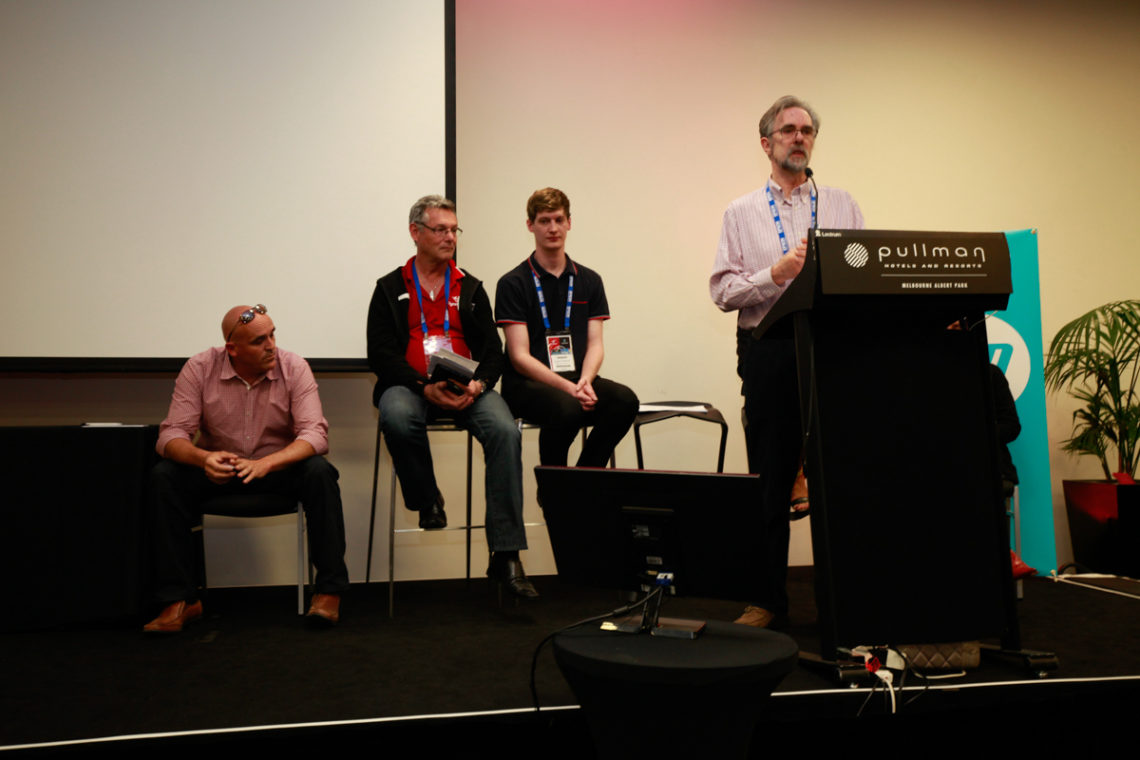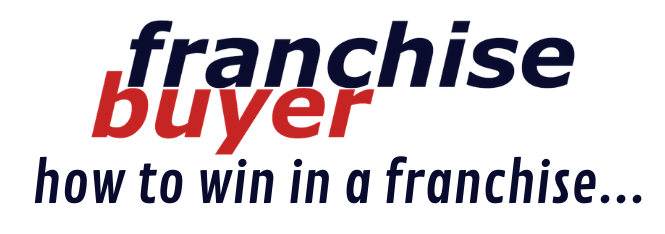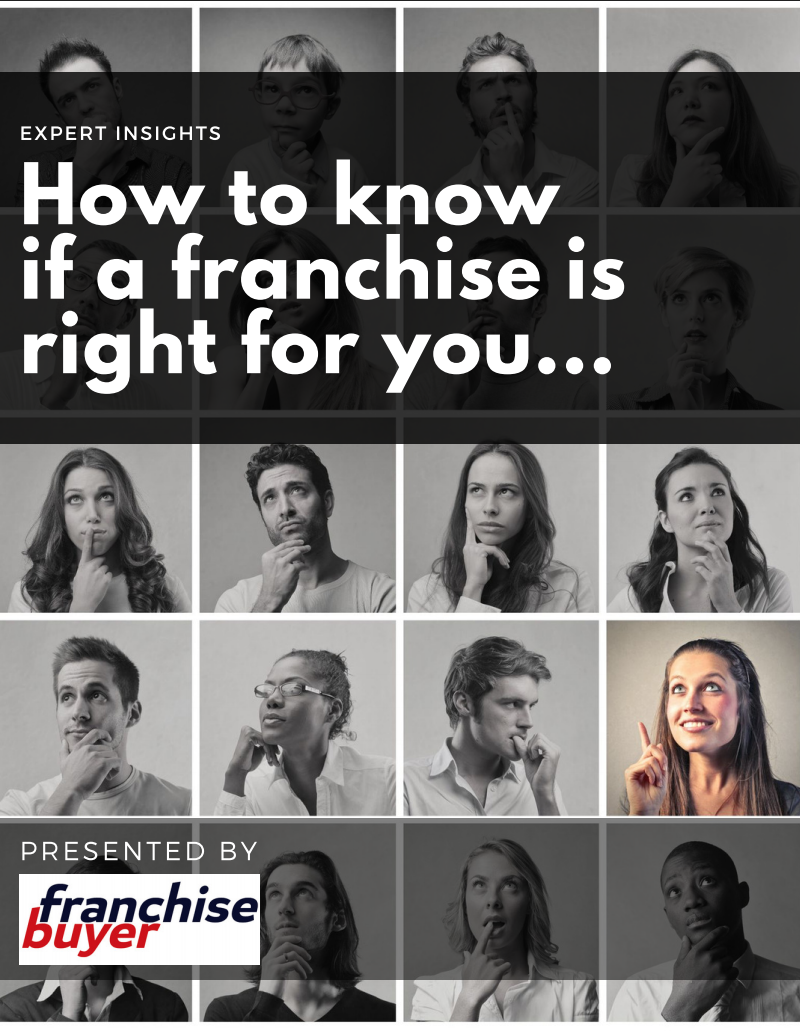September 26, 2019
20+ years as a franchise owner - comparing then till now...

Over 20 years in the game - a successful business, with a major contribution to the success of their entire franchise network.
Ross and Pam Wade are the franchise owners of Signarama at Dandenong, Victoria.
Offering graphic, branding and signage services, Signarama is part of the United Franchise Group (UFG). It’s the world’s largest sign franchise, with a presence in more than 60 countries and about 100 outlets in Australia. Being in the business for more than 20 years, this makes them foundation members of the original small band of Signarama veterans who pioneered this particular business model in Australia.
Ross is the first to admit that as it was uncharted territory, they made up a lot of stuff as they went along, figuring out what worked — and what didn’t — until they had a pretty smooth operation on the go. So smooth, in fact, that Ross and Pam were inducted into the Signarama International Hall of Fame in 2005.

Signarama Dandenong is a medium-sized business with seven employees plus Ross and Pam, who does the books part-time. Last year they did about $1.2 million in revenue and this year are on target for $1.5 million.
The early days
As Ross remembers it, he and his brother, Pete, fell into the signage business almost by accident. In 1998, the brothers were in the process of closing down the family engineering business after a prolonged industry downturn, when they spotted an ad for a signage business.
“It was a franchise called Signways,” Ross says. “I assumed it was working out of the back of a ute, but we went along to check it out and realised it was possible to buy a franchise in signage.”
After that, it was just a matter of, er, following the signs.
“We started seeing Signarama signs everywhere,” Ross recalls. “In Clayton, where our old engineering factory was, there were a couple of Signaramas going in. Then we needed some decals made up, so we called into what would become the Mount Waverley Signarama. They were still setting up their operation and weren’t really looking for work, but they stopped their set-up to make our decals. We started to think this Signarama business must be quite successful! So we rang them and they said they had a location coming up in Dandenong, an existing store that hadn’t gone well. We went and had a look and then did the deal.”
Not an instant success
Unfortunately for the Wades, the store did not prove an overnight success. The business was only five months old, but it was broken, and Ross had no option but to roll up his sleeves and fix it. He can see the funny side…now.
“The guy we bought it from just hadn’t done any work. It’s not ridiculously uncommon for people to spend money on franchises and think they can just sit back and rake in the money. Of course, that’s not how it works.”
There was certainly a lot to fix over the first six months of operation. “I’m one of those people who does everything the wrong way, and usually twice, to make sure it takes longer than it should! It was pretty traumatic, sort of reaping the whirlwind of all the things they’d done wrong. We found it only had one phone line so I had to buy a phone system. We had to get more lighting. We kept one employee from the original store — he only actually left about a year ago. The other staff member was supposedly a salesperson. There was a Salvation Army rehabilitation centre next door and it turned out this guy was a recovering heroin addict and the previous owner had got him really cheap. But he wasn’t actually recovering — he was still an addict — so he literally lasted five minutes! It was a lot of hard work, but slowly we grew the business.”

The originals
Dandenong was one of the original bunch of Signarama franchises in Victoria, where the parent company first established the brand, and Ross soon began to grow the business. By default, he became involved in organisation for the group, working way out of his comfort zone on things like pricing and marketing.
“We were soon one of the biggest in that early Victorian group of franchisees,” he says. “I got heavily involved in the owners’ meetings. This group of seven or eight branch stores would get together every two weeks and we’d talk about installs and pricing and all the other stuff we didn’t know much about. We were a tight little group because we were pretty much on our own. Back in those days, we didn’t have much support from the franchisor because they were busy marketing in other states. UFG have got a fantastic set-up now, but back in the day that didn’t exist.”
Despite or perhaps because of those early experiences, Ross and Pam became Signarama stalwarts, strong supporters of the brand and its parent group, UFG. In those early days, they regularly went to the UFG expos in the US, meeting many of the movers and shakers they now regard as good mates.
“I’ve always seen us as part of a team with the franchisor,” he says. “UFG boss Ray Titus is a good guy. He was just a youngster then and building a business himself. I’ve got a lot of respect for him. Travelling to America at least once a year really gave us the big picture. I see it as a partnership and that’s definitely the way it’s worked out. Nobody’s trying to make money out of the franchisees, we’re all in the trenches together.”
Ross has always been proactive in giving feedback to improve the Signarama system and is happy to be a mentor for those within the network who could use a bit of advice. He reckons a mentoring relationship permeates the whole organisation.
“When new people thank me for making the time available, I say it’s in my interest as well. I want to see the best people running Signarama stores because that lifts the whole brand. What we put into helping to develop those new franchisees works for the whole brand. It’s a good system.”

Changing times
Over 20 years in the signage game, Ross has seen a lot of changes both in the technology involved and in the way the market has been transformed.
“It was all computer-cut vinyl at the start and then the first digital printers came in,” Ross recalls. “We got one of those fairly early, but it wasn’t a very good machine. Now we’ve got all the machines in the place — Techno CNC routers, flatbed printers — it’s extraordinary how it’s changed. Now there’s a lot of digital technology as well. When I tell some of the younger guys at other stores about when we started and the prehistoric machines we used, it really marks me out as the old guy!”
For the signage industry, the transition to online advertising was a huge change — and a cost-saver.
“In the early days of the Victorian owners’ group, a lot of the discussion was about the amount of money we had to pay out to put half-page ads in the Yellow Pages and list all the stores,” Ross says. “Now that’s completely gone. We created an advertising fund 10-15 years ago and I’m president and treasurer of the committee. Running the national advertising for the group has given me a real understanding of that online space. We created a website, and now license that design out to brands in South Africa and NZ — the Americans have copied a fair bit of it as well. Google likes the idea of a single big company in the market, so they tend to rate us very highly and we get a lot of organic traffic through that.”
Despite the advent of the internet and online marketing, Ross reckons there is still a strong demand for signage. “When I joined the network, none of us had any background in signage,” he says. “I thought you’d sell a sign to a company and then five years later, they’d want another sign. But that’s not the way it works. The majority of our customers are consuming signage all the time. We service franchise groups, manufacturers, vehicle fleets — and our good clients buy signage all the time. Being in that business-to-business market is really good. It’s a visual industry — you make good work and put it out where everybody can look at it. And if your opposition does something clever, you can check it out, work out how they did it and copy it!”
Different from the rest
Signarama’s independent collective organisation makes for effective marketing. Ross says it’s a big point of difference from most big franchise systems where marketing is usually run by the franchisor.
“In Signarama, the marketing fund is run by the franchisees. We’ve got an incorporated association and collect money from each other to build our market presence. It’s kind of like 100 sign companies flying in formation. When we rebranded five or six years ago, we did a good job as a group on the rebrand, much better than in the US where they had a lot of non-compliant stuff going up. Although we have a large degree of independence in the Signarama system, when we need to act consistently we do so. Also, the stores are very accountable for bringing on new franchisees.”
Ross adds that the resulting flow of innovation and market information is an ace in the hole for Signarama franchisees.
“Most [other] multiple location sign companies are insular, they don’t want to share the information with each other,” he says. “But we know all the good stores, they know us and we share information all the time. We depend on each other. One of the things we say to our customers is: ‘Wherever you’ve got an office, so do we.’ We’ve had lots of national deals out of our Dandenong premises. I was just talking to my production manager about a couple of vehicles we’re doing for a store in Blacktown, NSW. We’re helping them problem-solve and rescheduling some jobs to fit in the first install next week, which is when their customer wants it. So it’s not just that we do work for other stores, we cooperate to problem-solve for each other as well. It’s a great asset to have.”
This cooperative attitude also stops Signarama franchisees from getting into any territorial squabbles. “The market is big enough and we’ve got a good discipline within the group so that we don’t market into other people’s territories,” Ross says. “As a group we communicate well, which prevents misunderstandings. And there are enough senior stores in the network, people who have been in the game for a while and have well-developed businesses. They carry a lot of authority within the franchisee group and can defuse any issues that crop up.”

Motivated man
So, after two decades in the signage game, what is it that keeps Ross Wade turning up for work each day?
“For me it’s that team and getting the people around you,” he says. “It’s like building a machine, in many ways — you’ve got to have all the pieces that fit. Signage is probably the most complex business you can franchise. You’ve got supply, advertising, production, install, purchasing — it’s not a cookie-cutter business. It’s a fully functional business that does all the business things. So you’ve got a team of people who cover a wide range of things. You’ve got to do your own marketing and be really sharp on sales. You’ve got to have a really good production team because the margins in signage are so low. You have to build a really good business to succeed in signage. We give confidence to customers with our reputation for good customer service. That’s our position in the market. Delivering that consistently you need good staff and that is my main motivator, training and working with these good people and dealing with the day.”
He reckons there’s really only one downside to the whole business — you become a sign nerd.
“We tell the new sales staff: ‘We’re about to ruin your life. From now on you’ll be living in a world of signs. You’ll notice them everywhere you go and you won’t be able to take your eyes off them!’”
















